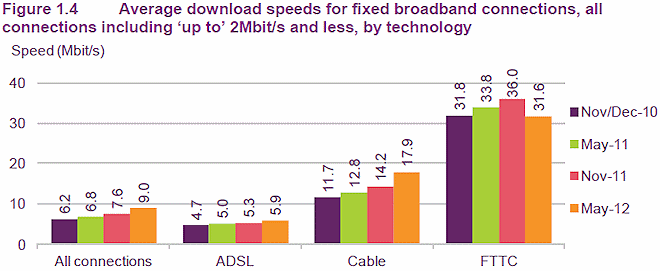UPD2 Ofcom Report Finds UK Average Broadband ISP Speeds Rise to 9Mbps
The UK telecoms regulator, Ofcom, has today published its latest study of the United Kingdom’s average fixed line internet performance. The report, which is based on data from May 2012, reveals that the average broadband download speed has jumped from 7.6Mbps (Megabits/sec) in the last survey to reach 9Mbps now (+19%).
Unfortunately one consequence of the new Advertising Standards Authority (ASA) guidelines for tackling misleading promotions of “up to” broadband ISP speeds (full summary), which has caused many ISPs to stop promoting speeds altogether, is that Ofcom can no longer produce a headline (advertised) vs real-speed comparison. Thankfully it remains very easy to see the difference between technologies.
Advertisement

To put that chart into perspective; ADSL2+ connections are theoretically capable of delivering speeds up to 24Mbps, although these are highly susceptible to interference through poor home wiring, longer telephone lines (among other things) and thus return comparatively slow performance.
Meanwhile Virgin Media’s Cable Modem (cable) platform currently offers top speeds of between 30Mbps and 100Mbps (note: not everybody has the new speeds yet), while BT’s FTTC is able to deliver a maximum of between 40Mbps and 80Mbps (note: most consumers are still on their 40Mbps service). Let’s take a look at how this works out with some real-world examples of ISP performance (BT’s 38-76Mbps solution is FTTC and Virgin’s is Cable).

Overall it should be clear that the ADSL2+ lines deliver well below what the technology itself is capable of, while the newer superfast broadband services seem much more capable, albeit not without some loss.
We also fully expect BT’s FTTC service to suffer slower real-world speeds in the future, which will occur as it pushes out to more rural areas where the technology’s VDSL2 component can lose performance over the longer telephones lines. Average actual speeds recorded for FTTC connections have already fallen by 12% (from 36Mbps to 31.6Mbps) in the six months to May 2012.
Advertisement
Indeed the urban versus rural Digital Divide is still quite stark. Ofcom’s latest data reveals that the average broadband speed in rural areas is now 3.5Mbps (up from only 3.3Mbps in Nov 2011), which compares with 10.5Mbps in urban areas (up from 8.8Mbps).
Ed Richards, Ofcom’s CEO, said:
“Our research shows that the move to faster broadband services is gathering momentum. Consumers are benefitting from network upgrades and the launch of new superfast packages, giving them faster speeds and greater choice.
We are continuing to work with the advertising code-writing bodies and ISPs to ensure that speeds advertised reflect actual speeds experienced, to allow consumers the ability to make informed decisions when shopping around to find the most suitable package.”
Separately Ofcom’s study found that 8% of residential broadband connections were superfast (i.e. delivering internet download speeds of 25Mbps+), compared with 5% six months previously and just 2% in May 2011. Most of the recent speed increases are as a direct result of this slow but steady growth in adoption. It should be noted that superfast broadband services are currently available to around 60% of the UK.
Overall Virgin Media’s ‘up to’ 100Mbps package was the fastest UK service and delivered average actual speeds of 88.3Mbps over a 24 hour period, while the 38Mbps and 76Mbps (advertised) BTInfinity service delivered a real-world average of 32.2Mbps and 58.5Mbps respectively. Clearly BT’s latest 80Mbps FTTC solution has caused the gap between what is possible and what is delivered to widen as it stretches the technology’s capabilities.
Consumers whom suffer serious problems with their ISPs broadband speed can get help through Ofcom’s Voluntary Broadband Speeds Code of Practice (Version 2), which requires member ISPs (Listed Here) to explain to new customers the access line speed that they are likely to achieve at home, and to try to resolve any problems when speeds fall significantly below the estimate. According to the v2 Code, if the problem cannot be resolved then customers will be able to leave their provider, without penalty, within the first 3 months of a contract.
Advertisement
As a side note, it’s worth remembering that Ofcom’s study only reflects packages from 8 of the UK markets largest broadband providers. It’s also based on tests that occurred in just 1,831 homes, which were carried out via specially adapted routers. Quite a small sample size.
Ofcom’s UK Fixed-Line Broadband Performance Study May 2012
http://stakeholders.ofcom.org.uk/binaries/research/broadband-research/may2012/Fixed_bb_speeds_May_2012.pdf
UPDATE 1:17pm
As usual we’ve had a bunch of new comments on the report reach our inbox over the past hour. Both are quoted below.
Boris Ivanovic, Chairman of ISP Hyperoptic, said:
“If the UK wants to compete in a global arena, the area that must be addressed is the Government mindset. As it stands, the UK fails to make the top 10 countries for broadband speeds and doesn’t even figure on FTTH leader-boards. As a nation, it’s very much a follower than a leader and that needs to change.
The irony is that the UK is one of the biggest users of technology. The average Briton is spending 50 hours a week online and online shopping per person is higher than anywhere else. The UK internet economy has been valued at £82bn – worth almost 8.3% of GDP – more than any other country in the world. As such, high speed broadband is increasing moving from a “nice to have” to a necessity by which to do business. And as far as our personal lives go, it’s becoming essential from a social perspective and is judged by many to be more important to them than the likes of coffee, or even sex. Yet despite this adoption and appetite, there is a clear disconnect between the level of demand and the quality of the UK broadband infrastructure.
In order to address this mindset the Government needs have a much more ambitious vision and pragmatic strategy, supported by a financial investment. £530 million may sound like a lot, but it doesn’t when you put it into context. The Chinese government recently allocated 80% of its $303 billion infrastructure investment for broadband FTTH development. If you pro-rata that per person in the UK you would be looking at least £8 billion. By putting clear and ambitious investment in an infrastructure that has distinct correlation with the UK economy, it will deliver long term long term RoI. You have to question whether the £17 billion for HS2 would be better spent on a broadband infrastructure.
In addition to the investment, the Government needs to be clear about the goals they are setting for themselves and the market. Firstly, they need to agree universal coverage of high-speed internet. For 90 per cent of the population it’s imperative it is delivered via FTTH – the technology exists to bring standardised cost effective 1 Gig speeds to the majority of UK businesses and consumers. Secondly, for remote areas where it isn’t cost effective to pull fibre to, there are extension options to plug the gap – such as satellite broadband.
In summary, the country’s broadband strategy needs to be far more ambitious. If the UK is constantly trying to plug the demands of yesterday, it won’t be ready to enable the needs of tomorrow. The nay-sayers that ask why we need speeds of up to 1 Gig just need to look at how speeds have evolved over the last ten years. The industry is expanding at an astronomical rate and we need to think ahead and lead, rather than follow.”
Chris Holland, Communications Consumer Panel Member, said:
“It’s good news that average broadband speeds are improving and that fewer internet service providers (ISPs) make speed claims in their advertising. The Panel has consistently argued that ISPs should stop using potentially misleading ‘up to’ speeds. We know that consumers on the same package can receive different speeds – depending, for example, on things like their distance from the exchange. That’s why we are calling on ISPs to provide equally prominent additional qualifying information if they advertise a headline ‘up to’ speed.
We also want to remind ISPs that the Code requires them to give potential new customers information about their likely broadband speeds early in the sales process, before they decide to buy a new service. Ofcom’s recent Voluntary Code of Practice on broadband speeds mystery shopping research found that 7% of consumers would not get a speed estimate via telephone sales – but, even when the consumer was given that information, in just over a third of the cases (34%) it was because the caller had to request it.
Consumers can only make an informed choice if they can easily compare different packages and providers. We will be watching developments in this area carefully to ensure that consumers are not disadvantaged.”
UPDATE 24th August 2012
It’s worth noting that Ofcom’s study also appears to exclude test results from Market 1 areas, which mostly reflect the last 10% of the UK’s most rural population where BT is usually the sole provider of broadband services. In reality this wouldn’t have much of an impact on the overall result as it only affects a tiny number of tests.
It would perhaps be useful to see a larger study or breakdown of broadband performance in Market 1 areas.
Mark is a professional technology writer, IT consultant and computer engineer from Dorset (England), he also founded ISPreview in 1999 and enjoys analysing the latest telecoms and broadband developments. Find me on X (Twitter), Mastodon, Facebook, BlueSky, Threads.net and Linkedin.
« ONS Q2 2012 Report Finds 7.82 Million UK Adults Have Never Gone Online

















































Comments are closed